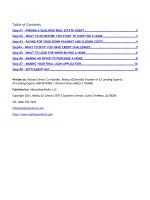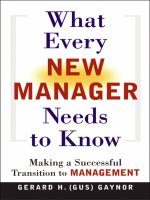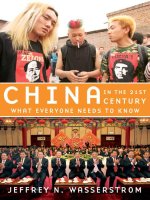Economic development what everyone needs to know, 2nd edition
Bạn đang xem bản rút gọn của tài liệu. Xem và tải ngay bản đầy đủ của tài liệu tại đây (1.29 MB, 249 trang )
i
ECONOMIC DEVELOPMENT
WHAT EVERYONE NEEDS TO KNOW®
ii
iii
ECONOMIC
DEVELOPMENT
WHAT EVERYONE NEEDS TO KNOW®
Second Edition
MARCELO M. GIUGALE
1
iv
3
Oxford University Press is a department of the University of Oxford. It furthers
the University’s objective of excellence in research, scholarship, and education
by publishing worldwide. Oxford is a registered trademark of Oxford University
Press in the UK and certain other countries.
“What Everyone Needs to Know” is a registered trademark
of Oxford University Press.
Published in the United States of America by Oxford University Press
198 Madison Avenue, New York, NY 10016, United States of America.
© Oxford University Press 2014, 2017
First Edition published in 2014
Second Edition published in 2017
All rights reserved. No part of this publication may be reproduced, stored in
a retrieval system, or transmitted, in any form or by any means, without the
prior permission in writing of Oxford University Press, or as expressly permitted
by law, by license, or under terms agreed with the appropriate reproduction
rights organization. Inquiries concerning reproduction outside the scope of the
above should be sent to the Rights Department, Oxford University Press, at the
address above.
You must not circulate this work in any other form
and you must impose this same condition on any acquirer.
CIP data is on file at the Library of Congress
ISBN 978–0–19–068842–4 (pbk.); 978–0–19–068841–7 (hbk.)
1 3 5 7 9 8 6 4 2
Paperback printed by WebCom, Inc., Canada
Hardback printed by Bridgeport National Bindery, Inc., United States of America
v
In Memory of Alicia Tamburelli … Gracias por todo, Vieja!
vi
vii
CONTENTS
PREFACE: WHOM IS THIS BOOK FOR?
ACKNOWLEDGMENTS
xi
xv
Overview: What Is Economic Development
and What Does This Book Say about It?
1
1.Governments: One Day, They Will Work for You
8
Why do obvious reforms never happen?
8
How is the relationship between the state and the citizen changing?
11
Why should governments intervene in markets?
14
Has government decentralization worked?
17
Do we really care about graft?
20
Why can’t we stop conflict?
24
Are natural resources a curse?
26
What are the signs a country is managing its riches well?
29
2.Economic Policy: The Basics You’ve Got to
Get Right
33
Why do governments struggle to prop up the world’s economy?
33
What is structural reform?
36
vii
viii Contents
What is the G20 and why does it matter for development?
39
How do governments regulate the financial sector?
41
Do the Fed’s decisions matter to the developing world?
44
What do Europe’s woes mean for the world’s poor?
46
How do you prepare for the next global crisis?
48
Was the commodity bonanza wasted?
51
Will globalization end?
52
Why does growth happen in some places and not in others?
55
Why is it so difficult to agree on tax reform?
59
What is the global tax war?
62
3.Social Policy: Old War, New Weapons
66
Why did Piketty’s work pique our sudden interest in inequality?
66
How many people live in extreme poverty?
69
How can we help the new poor?
72
Can we end poverty?
75
Is there a way to measure human opportunity?
77
Why are statistics so important in ending poverty?
80
Do we know the real impact of government interventions?
83
Can cheap oil hurt the poor?
86
4.Inclusion: Those Who Are Always Left Behind
89
Will we ever reach gender parity?
89
Has globalization helped or hurt women?
92
Impact evaluation: A woman’s best friend?
94
How did average housewives become the greatest generation
of Argentine women?
97
Why do the poor complain so little?
100
Why is early childhood development so difficult?
103
What do we know about informal workers?
106
ix
Contents ix
5.Sectors: What Ministers Will Worry
about—or Should
110
Can governments create industries?
110
Does foreign investment help you join global value chains?
113
Can you innovate your way out of the middle-income trap?
116
From Miami to Mumbai: What makes cities competitive?
119
How will technology shape the world of tomorrow’s leaders?
123
How will tomorrow’s infrastructure be built?
126
How green should economic growth be?
129
Is it time to end fuel subsidies?
133
Can emerging economies have universal health coverage?
135
How do you measure the economic impact of Ebola?
138
Is there new power in entertainment education?
141
How do you deal with rising food prices?
143
What are “commodity super-cycles,” and why do they matter?
146
How do oil-rich governments respond to falling oil prices?
149
Should foreign aid be abandoned?
153
What’s the future of foreign aid?
157
6.Africa: The Last Frontier
161
Is Africa’s emergence for real?
161
Can Africa be defragmented?
165
Can Africans become shareholders in their own wealth?
168
How have the world’s newest nations fared?
171
Can Africa compete with China?
174
Can Africa follow China’s industrialization path?
177
Can services drive Africa’s development?
180
Can Africa feed Africa?
183
How does one fix Africa’s statistics?
186
Did debt forgiveness work in Africa?
190
x
x Contents
Concluding Thoughts
194
NOTES
BIBLIOGRAPHY
INDEX
197
205
217
xi
PREFACE: WHOM IS THIS BOOK FOR?
Imagine that you want to get a feel for modern surgery.
You may be an undergraduate student pondering medical school. Or a journalist researching a story about the
new, cool things medicine can do. Or a politician trying to
sound credible on healthcare reform. You may be one of
those patients who wants to understand what the doctors
are about to do to her. You could also be an experienced
family physician who needs a quick refresher on the latest
surgical techniques—which you may rarely practice. What
is the best and fastest way to go about it? Simple: you get
a friendly surgeon to lend you scrubs, take you inside the
operating room, and let you witness a few actual operations.
No lectures, no theories, no jargon—just a direct glance at
the real thing. Well, that is in essence what this book does
for those who are interested in economic development.
A series of short questions and answers, written in
kitchen-table language, explain the issues that policymakers face, tell what the most promising instruments are in
helping societies prosper, and show the limits of what we
know. In fact, the idea is to get you to the frontier of the
development profession, the point at which knowledge
stops and ignorance starts, and to share with you what we
don’t know and make you think for yourself.
xii
xii Preface
That frontier of knowledge changes all the time. Which
is why this is the second edition of this book. The first was
published in early 2014, and already much has been newly
learned from practice. So I added twenty new questions
and updated many of the answers to the questions we had
before.
Like its predecessor, this second edition will have no
master conceptual framework. There will be no formulae, tables, or charts either. Rather, we will talk, first about
governments—after all, they are the ones who make decisions on policy—and about how they so frequently fail at
what they do. We will then turn to the kind of economic
policies without which no country can make it. Here is
where technical orthodoxy will be translated into common
sense—
think about “macroeconomic consistency,” “balanced budgets,” and “monetary stability” as making ends
meet for a country as a whole. From there, we will look at
the excitement and the frustration that new tools and new
realities are bringing to poverty reduction, social inclusion, education, health, technology, infrastructure, foreign
aid—you name it. In the end, we will see all these tools
in action in the region that represents development—and
the need for it—better than any other: Africa. If, after all
that, you are thirsty for more information, you will find a
bibliography of suggested further readings. Some of them
are classic, must-read books. Some are journal articles that
changed the way economists think. And many are available online for free.
Three disclaimers before we go into the operating room.
First, earlier versions of these essays have been published
as blogs, opinion editorials, or both, in print or online. And
I have tested the ideas in this book during dozens of lectures and speeches at universities in Africa, Asia, Europe,
Latin America, and the United States. This allowed people
to comment and allowed me to learn from those comments.
xii
Preface xiii
Second, I have spent the past twenty-seven years working
for the World Bank, on four continents and in many capacities. There is no better institutional balcony from which to
witness development—its actors, sectors, thinkers, places,
lessons, and challenges. Still, the views conveyed here are
my own, and they do not necessarily represent those of the
World Bank or of the countries that own it. Third, I belong
to no political party, commercial enterprise, interest group,
or intellectual movement. So I am free to speak my mind.
Marcelo Giugale
Winter of 2017
@Marcelo_WB
xvi
xv
ACKNOWLEDGMENTS
There are many colleagues in and around the profession
whom I would like to thank for teaching me so much and
for helping me make Economic Development: What Everyone
Needs to Know® a reality. Omar Arias, Nancy Benjamin,
Paul Brenton, Otaviano Canuto, Daniel Cotlear, Andrew
Dabalen, David de Ferranti, Shantayanan Devarajan, Nora
Dihel, Makhtar Diop, Bernard Funck, Ejaz Ghani, Swati
Ghosh, Markus Goldstein, Faya Hayati, Fernando Im, Kai
Kaiser, Olivier Lafourcade, Jan Loeprick, Gladys Lopez-
Acevedo, Nga Thi Viet Nguyen, Margaret Miller, John
Panzer, Remy Prud’homme, Anand Rajaram, Fernando
Rojas, David Rosenblatt, Jaime Saavedra, Apurva Sanghi,
Christopher Sheldon, Antoine Simonpietri, Mark Thomas,
Volker Treichel, Jose Molinas Vega, Eduardo Velez, Jan
Walliser, and Steve Webb either educated me in their
respective fields or graciously invited me to comment on
subjects they know much better than I.
Alex Fleming, Ellen Harvey, Michael Jelenic, and
Susan Petersen encouraged me to see and tell the human
story behind each technical issue, no matter how complex. Cristina Palarca and Patricia Mendez have over the
years kept me organized in my day job, so I could spend
nights, weekends, and airplane hours writing. And Angela
xvi
xvi Acknowledgments
Chnapko, my publisher, saw the beauty—and took the
risk—of bringing the trenches of the war on poverty to the
hands and iPads of those who are not poor.
More personally, I am one lucky writer, blessed by the
love and support of an incredible family. My kids—Carla,
Lauren, and Juan—cheered me along and patiently put
up with my passion for explaining things. And Pichu, my
beloved wife of thirty-one years and my best friend, taught
me that all problems in society really boil down to one solution: a good education. As a Special Ed teacher for some of
the most special children there are, she should know.
To all, thank you.
Marcelo Giugale
Winter of 2017
@Marcelo_WB
xvi
ECONOMIC DEVELOPMENT
WHAT EVERYONE NEEDS TO KNOW®
xvi
1
OVERVIEW
WHAT IS ECONOMIC DEVELOPMENT
AND WHAT DOES THIS BOOK
SAY ABOUT IT?
At its most basic level, economic development is the process through which a community creates material wealth
and uses it to improve the well-being of its members. This
calls for many interrelated ingredients: healthy and educated workers, more machines and better infrastructure,
advanced knowledge and pathbreaking ideas, savers and
financiers, peace and the rule of law, and social inclusion
and individual rights. The process can be helped or hindered by governments’ policies and programs, so when it
happens, it is usually associated with enlightened leaders.
Note that economic development is more than a growing economy; you can have much of the latter but none of
the former—for example, when the wealth that is created
only benefits a small elite. That’s why those who believe
in economic development—this writer among them—also
believe that poverty need not exist or persist.1
Technically, you are poor if you live on $3.10 a day or
less. And if you live on less than $1.90—as almost 800 hundred million people do—you are “extremely poor.” Those
are the universal definitions of poverty, which economists
2
2 Economic Development
use to make comparisons across countries.2 Now, things
can get more complicated. Each country also has its own
official poverty line—the level of yearly income or consumption below which you are considered poor by your
government. In 2015, the United States set that line at
$11,770, implying that about 15 percent of Americans were
poor. The broadly comparable figures for Nigeria were
around $460 and 60 percent. In other words, being poor in
Lagos is very different from being poor in Washington, DC.
To add even more texture, many rightly argue that money
is not all that counts in life. So additional dimensions are
frequently added to the definition of poverty—how stable your income is, how included you feel in your society,
how much opportunity your children have, how safe your
neighborhood is, and how clean the air you breathe is.
When you finish reading this book, I hope you are convinced that economic development—and the reduction in
poverty that goes with it—has never been more feasible for
more countries. Mind you, there are huge risks behind that
optimism. Big economies could fall into fiscal, financial, or
confidence crises, and the effects could spill over to the rest
of the world. Populist politicians may turn public opinion
against globalization—the idea that, in the long run, we
benefit from the free movement of goods, people, knowledge, and money. Natural disasters are more frequent and
more catastrophic. And some places seem stuck in war. But
the positive feeling of possibility, which permeates across
issues, markets, sectors, policies, and nations, is real. It is
inspired by a series of deep, simultaneous transformations
that, slowly but surely, are changing the way we work,
consume, save, and invest. Think of many tectonic plates
shifting at the same time. What are those transformations?
First, the old relationship between “the state and the
people” is becoming one between “the state and the person.” Each of us will begin to have direct, individualized
3
Overview 3
contact with our government. More and more of the things
that the typical government gives to or does for its citizens—from public schooling to subsidized energy—will
be turned into cash, delivered to you via cell phone or debit
card. Even the national ownership of natural resources
will gradually be redefined—just for being a citizen, you
may one day get direct dividends from the companies that
exploit your country’s oil, gas, and minerals. The personalized relationship will not be just about money. It will also
be about information. From your spending habits to your
complaints about public services that don’t work, your
feedback will go directly to those who make decisions that
affect you. Sound futuristic? Well, keep the idea in mind
as you read through the chapters, and you’ll see that it is
already happening.
Second, the combination of more democracy and better data will make for smarter decisions, both by governments and by people. From finding the true impact—and
the real beneficiaries—of public expenditures to controlling teacher absenteeism, and from fighting gender discrimination to facilitating cross-border trade, knowledge
put in the hands of voters will translate into political pressure and, ultimately, reform. Information will not always
and automatically lead to activism, though—not everyone
has the time or the means for it. But aberrations that have
survived for decades—like using taxpayers’ money to pay
for the gasoline consumed by the rich—will begin to crumble. Easy-to-understand “standards” will help us measure
the performance of those who govern us. If the average
second-grader cannot read at least sixty words per minute,
there is something wrong with public education—that’s a
standard. And when public services like schools, hospitals,
and the police fail, users no longer have to wait until the
next election to punish the politician in office—they can
shame him in an instant with a text, a tweet, or a post. All
4
4 Economic Development
you need for this to happen is freedom of expression and
the Internet. In fact, communication technology is speeding government accountability into real time.
Third, there will be no reason to leave anyone behind or
disadvantaged. In a break from history, and thanks to better
and cheaper identification technology, governments will
know the poor by name, individually. Social assistance programs will be better tailored to their beneficiaries. This will
reduce waste and increase impact. Blanket subsidies that
benefit both rich and poor—say, selling electricity below
cost for all houses—will disappear, saving money that can
be then spent only on those in real need. Living on two dollars a day may indeed cease to be a relevant way to measure
poverty, and other aspects of a good life may gain attention, like the risks you and your family face. And we will
move away from the never-ending debate about equality
of outcomes among adults—whether they should all earn
and own the same—toward a consensus around equality
of opportunity among children. Who can be against that?
Fourth, not only will citizens have better tools to change
how governments behave, but the reverse will also be true.
As hard evidence piles up on the role that culture plays
in core development problems—from corruption and gender inequity to pollution and informality—new emphasis
will be put on using public policy to change our values—
those that make us think and act in a certain way. More
countries will start to gather data on people’s noncognitive skills—personality traits like conscientiousness, agreeableness, and extroversion—and to understand how those
skills interact with cognitive ones—like IQ, test scores, or
years of schooling. This could bring a major breakthrough
in raising labor productivity: after all, employers pay more
for workers who are both trained and trainable. One day,
public education will balance teaching facts with teaching
behaviors, knowledge with attitude.
5
Overview 5
Fifth, the main tenets of economic management are clear
and broadly accepted. The global financial crisis of 2008–
2009 and its long aftermath may have shaken some technical paradigms, especially about the wisdom of leaving
bankers unchecked. A new wave of nationalism may have
given us Brexit and bad-mouthed globalization. But sensible practitioners have not renounced the old religion of
open economies, balanced budgets, independent central
banks, low debt, good public institutions, smart regulation,
lots of competition, and fair treatment of investors—big
and small, local and foreign. Just remember this: economic
growth is necessary but not sufficient for poverty to fall,
and inflation is sufficient but not necessary for poverty
to rise. People have understood that asymmetry: it has
become more difficult for presidential candidates to win
elections on a platform—or a brand—of fiscal mismanagement, rising prices, a stagnant economy, or frightened
investors.
Sixth, the countries that will succeed—and many will—
are those that will be able to balance economic discipline
with social solidarity. Why should balancing efficiency
with equity—
markets with people, if you will—
be the
formula for success? Because it seems to align the entire
society behind a broad, national vision—open for business and happy to pay so nobody, especially children, lacks
the basics. This isolates economic development from wild
political swings. Whether the Right or the Left comes to
power becomes almost irrelevant. All that matters to voters is who is better at delivering the common vision.
Seventh, barring major surprises, Africa will finally
make it. Yes, the continent looked promising many times
before—and failed to take off. Much of its current shine
is due to extractive industries like oil, gas, and minerals,
whose international prices can—and do—swing widely.
Not to mention the violent conflict that seems perennial in
6
6 Economic Development
some of its countries. But Africa’s emergence runs deeper.
For one, the technologies for exploration and exploitation
of its riches are getting cheaper, faster, and cleaner—many
think that only one-
tenth of its natural resources have
been discovered. This time, the bonanza may be more
about quantities than about prices. The spread of democracy is raising the quality of public policy among African
governments—slowly, to be sure. The region’s giant agricultural potential remains mostly untapped. And, in many
areas, demography is beginning to show the benefits of
slower population growth—fewer dependents per worker.
But, while all that is very exciting, nothing could transform and enrich Africa more than its self-integration. It
remains a fragmented place, where people, goods, and
capital can barely move from country to country, even
between countries that have signed free trade agreements.
Bureaucracy, overregulation, and monopolies make it
almost impossible for African workers, traders, and
financiers—except for the large and connected ones—to go
where there is more demand for them. Those same barriers
kill the possibility of forming the type of production chains
that made East Asia so successful—where final products
are assembled with components from many countries—so
successful. They also kill the possibility that Africa can feed
itself: it easily would, if food could circulate freely within
the region. African nations usually say that their past was
frustrated by how they were treated by outsiders—they
are probably right on that. But how ironic is it that their
future now depends on how they treat one another.
A final word before we jump into the chapters. From
this overview, you may already get a sense that much can
be done to bring people out of poverty. But you may also
feel that in economic development there are few, if any,
certainties. What works in one country may not work in
another. You can spot broad trends but will always find









